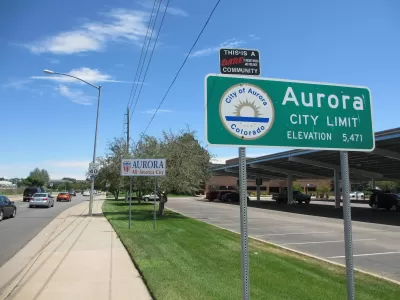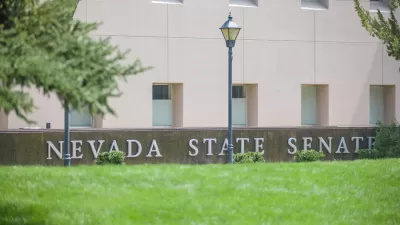Drought is reshaping western U.S. landscapes. Las Vegas banned ornamental grass in 2021. Aurora is now the first municipality in Colorado to curb the use of some grasses in new developments.

Aurora, Colorado is on the verge of banning certain varieties of grass—a move that is likely to become a trend in drought-stricken cities throughout the U.S. West.
Lindsey Toomer reports for the Denver Gazette that the Aurora City Council is one final vote away from restricting the use of “cool weather turf” (e.g., Kentucky bluegrass and fescue) for all development and redevelopment projects as well as for all new golf courses.
“A fact sheet for the ordinance says that Aurora gets less than 15 inches of precipitation every year. But cool weather turf requires as much as 28 inches of precipitation or irrigation in order to survive, and outdoor use accounts for half of the water used in Aurora every year,” explains Toomer.
More details on the ordinance, provided by Toomer:
The ordinance would primarily allow turf only in active or programmed recreation, such as sports fields, or other areas serving non-organized sports events, such as parks. Cool weather turf would be prohibited in medians, curbside landscape, residential front yards and limited in backyards to 500 square feet or 45% of the backyard, whichever is less. It also prohibits use of cool weather turf for new golf courses and bans ornamental water features, such as waterfalls, basins, ponds and exterior decorative fountains.
Aurora joins a small group of U.S. cities implementing drought restrictions in the landscapes of the built environment. Las Vegas, Nevada famously banned the use of Colorado River water for “nonfunctional turf” or “ornamental grass” in 2021. The entire Colorado River watershed is facing unprecedented drought conditions as a “megadrought” persists through the Southwest.
FULL STORY: Aurora gives unanimous initial approval to cool weather turf ban

Maui's Vacation Rental Debate Turns Ugly
Verbal attacks, misinformation campaigns and fistfights plague a high-stakes debate to convert thousands of vacation rentals into long-term housing.

Planetizen Federal Action Tracker
A weekly monitor of how Trump’s orders and actions are impacting planners and planning in America.

In Urban Planning, AI Prompting Could be the New Design Thinking
Creativity has long been key to great urban design. What if we see AI as our new creative partner?

Massachusetts Budget Helps Close MBTA Budget Gap
The budget signed by Gov. Maura Healey includes $470 million in MBTA funding for the next fiscal year.

Milwaukee Launches Vision Zero Plan
Seven years after the city signed its Complete Streets Policy, the city is doubling down on its efforts to eliminate traffic deaths.

Portland Raises Parking Fees to Pay for Street Maintenance
The city is struggling to bridge a massive budget gap at the Bureau of Transportation, which largely depleted its reserves during the Civd-19 pandemic.
Urban Design for Planners 1: Software Tools
This six-course series explores essential urban design concepts using open source software and equips planners with the tools they need to participate fully in the urban design process.
Planning for Universal Design
Learn the tools for implementing Universal Design in planning regulations.
Gallatin County Department of Planning & Community Development
Heyer Gruel & Associates PA
JM Goldson LLC
City of Camden Redevelopment Agency
City of Astoria
Transportation Research & Education Center (TREC) at Portland State University
Jefferson Parish Government
Camden Redevelopment Agency
City of Claremont





























